Engage NY Eureka Math Geometry Module 1 Lesson 10 Answer Key
Eureka Math Geometry Module 1 Lesson 10 Example Answer Key
Examples
Example 1.
In the figure to the right, \(\overline{A B}\) || \(\overline{C D}\) and \(\overline{B C}\) || \(\overline{D E}\). Prove that m∠ABC=m∠CDE.
(Is an auxiliary segment necessary?)

Answer:
\(\overline{A B}\) || \(\overline{C D}\), \(\overline{B C}\) || \(\overline{D E}\) Given
m∠ABC = m∠BCD If parallel lines are cut by a transversal, then alternate interior angles are equal in measure.
m∠BCD = m∠CDE If parallel lines are cut by a transversal, then alternate interior angles are equal in measure.
m∠ABC = m∠CDE Transitive property
Example 2.
In the figure to the right, \(\overline{A B}\) || \(\overline{C D}\) and \(\overline{B C}\) || \(\overline{D E}\). Prove that b+d=180.
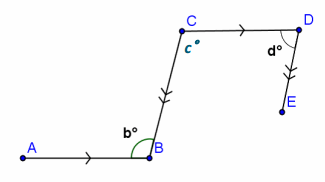
Answer:
Label c°.
\(\overline{A B}\) || \(\overline{C D}\), \(\overline{B C}\) || \(\overline{D E}\) Given
b=c If parallel lines are cut by a transversal, then alternate interior angles are equal in measure.
c+d=180 If parallel lines are cut by a transversal, then same-side interior angles are supplementary.
b+d=180 Substitution property of equality
Example 3.
In the figure to the right, prove that d=a+b+c.
Answer:
Label Z and z.
z=b+c The exterior angle of a triangle equals the sum of the two interior opposite angles.
d=z+a The exterior angle of a triangle equals the sum of the two interior opposite angles.
d=a+b+c Substitution property of equality
Eureka Math Geometry Module 1 Lesson 10 Exercise Answer Key
Opening Exercise
In the figure to the right, \(\overline{A B}\) || \(\overline{D E}\) and \(\overline{B C}\) || \(\overline{E F}\). Prove that b=e.
(Hint: Extend \(\overline{B C}\) and \(\overline{E D}\).)
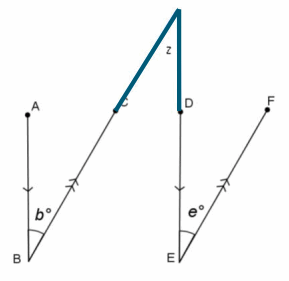
PROOF:
\(\overline{A B}\) || \(\overline{D E}\), \(\overline{B C}\) || \(\overline{E F}\) Given
b=z If parallel lines are cut by a transversal, then alternate interior angles are equal in measure.
z=e If parallel lines are cut by a transversal, then alternate interior angles are equal in measure.
b=e Transitive property
In the previous lesson, you used deductive reasoning with labeled diagrams to prove specific conjectures. What is different about the proof above?
Drawing or extending segments, lines, or rays (referred to as auxiliary lines) is frequently useful in demonstrating steps in the deductive reasoning process. Once \(\overline{B C}\) and \(\overline{E D}\) were extended, it was relatively simple to prove the two angles congruent based on our knowledge of alternate interior angles. Sometimes there are several possible extensions or additional lines that would work equally well.
For example, in this diagram, there are at least two possibilities for auxiliary lines. Can you spot them both?
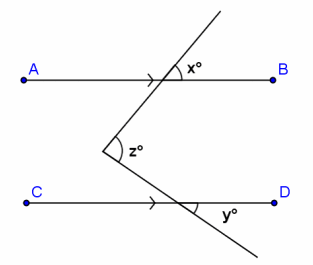
Answer:
Given: \(\overline{A B}\) || \(\overline{C D}\).
Prove: z=x+y.
Discussion
Here is one possibility:
Given: \(\overline{A B}\) || \(\overline{C D}\).
Prove: z = x + y.
Extend the transversal as shown by the dotted line in the diagram. Label angle measures v and w, as shown.
What do you know about v and x?
About w and y? How does this help you?
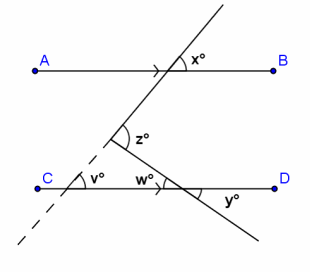
Write a proof using the auxiliary segment drawn in the diagram to the right.
Answer:
\(\overline{A B}\) || \(\overline{C D}\) Given.
z=v+w The exterior angle of a triangle equals the sum of the two interior opposite angles.
x=v If parallel lines are cut by a transversal, then corresponding angles are equal in measure.
y=w If parallel lines are cut by a transversal, then corresponding angles are equal in measure.
z=v+w Angle addition postulate
z=x+y Substitution property of equality
Another possibility appears here:
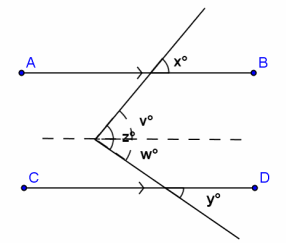
Given: \(\overline{A B}\) || \(\overline{C D}\).
Prove: z=x+y.
Draw a segment parallel to \(\overline{A B}\) through the vertex of the angle measuring z degrees. This divides the angle into two parts as shown.
What do you know about v and x?
Answer:
They are equal since they are corresponding angles of parallel lines crossed by a transversal.
About w and y? How does this help you?
Answer:
They are also equal in measure since they are corresponding angles of parallel lines crossed by a transversal.
Write a proof using the auxiliary segment drawn in this diagram. Notice how this proof differs from the one above.
Answer:
\(\overline{A B}\) || \(\overline{C D}\) Given
x=v If parallel lines are cut by a transversal, the corresponding angles are equal.
y=w If parallel lines are cut by a transversal, the corresponding angles are equal.
z=v+w Angle addition postulate
z=x+y Substitution property of equality
Eureka Math Geometry Module 1 Lesson 10 Problem Set Answer Key
Question 1.
In the figure to the right, \(\overline{A B}\) || \(\overline{D E}\) and \(\overline{B C}\) || \(\overline{E F}\). Prove that m∠ABC=m∠DEF.
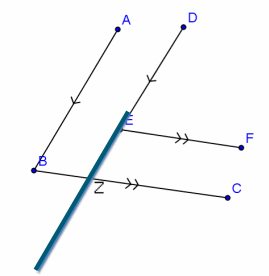
Answer:
Extend \(\overline{D E}\) through \(\overline{B C}\), and mark the intersection with \(\overline{B C}\) as Z.
\(\overline{A B}\) || \(\overline{D E}\), \(\overline{B C}\) || \(\overline{E F}\) Given
m∠ABC=m∠EZC If parallel lines are cut by a transversal, then corresponding angles are equal in measure.
m∠EZC=m∠DEF If parallel lines are cut by a transversal, then corresponding angles are equal in measure.
m∠ABC=m∠DEF Transitive property
Question 2.
In the figure to the right, \(\overline{A B}\)∥\(\overline{C D}\). Prove that m∠AEC = a° + c°.
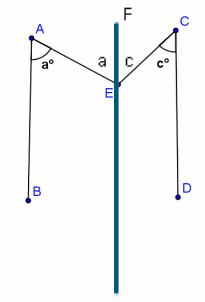
Answer:
Draw a line through E parallel to \(\overline{A B}\) and \(\overline{C D}\).
Add point F.
\(\overline{A B}\)∥\(\overline{C D}\) Given
m∠BAE=m∠AEF If parallel lines are cut by a transversal, then alternate interior angles are equal in measure.
m∠DCE=m∠FEC If parallel lines are cut by a transversal, then alternate interior angles are congruent equal in measure.
m∠AEC=a°+c° Angle addition postulate
Eureka Math Geometry Module 1 Lesson 10 Exit Ticket Answer Key
Write a proof for each question.
Question 1.
In the figure to the right, \(\overline{A B}\) || \(\overline{C D}\). Prove that a°=b°.
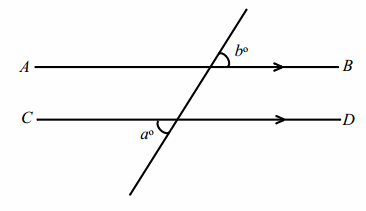
Answer:
Write in angles c and d.
\(\overline{A B}\) || \(\overline{C D}\) Given
a°=c° Vertical angles are equal in measure.
c°=d° If parallel lines are cut by a transversal, then alternate interior angles are equal in measure.
d°=b° Vertical angles are equal in measure.
a°=b° Substitution property of equality
Question 2.
Prove m∠p=m∠r.
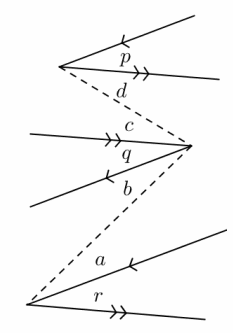
Answer:
Mark angles a, b, c, and d.
p || q Given
m∠p+m∠d=m∠c+m∠q If parallel lines are cut by a transversal, then alternate interior angles are equal in measure.
m∠d=m∠c If parallel lines are cut by a transversal, then alternate interior angles are equal in measure.
m∠p=m∠q Subtraction property of equality
m∠q+m∠b=m∠a+m∠r If parallel lines are cut by a transversal, then alternate interior angles are equal in measure.
m∠a=m∠b If parallel lines are cut by a transversal, then alternate interior angles are equal in measure.
m∠q=m∠r Substitution property of equality and subtraction property of equality
m∠p=m∠r Substitution property of equality